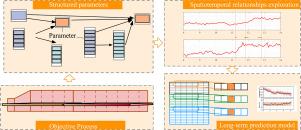A new spatiotemporal long-term prediction method for Continuous Annealing Processes
IF 7.5
2区 计算机科学
Q1 AUTOMATION & CONTROL SYSTEMS
Engineering Applications of Artificial Intelligence
Pub Date : 2024-11-01
DOI:10.1016/j.engappai.2024.109514
引用次数: 0
Abstract
Accurately and consistently predicting the heating state is essential to maintain stable operation in continuous annealing processes (CAPs). However, long-term prediction biases often arise due to unmodeled dynamics associated with high-dimensional, time-varying, and strongly coupled variables. This study introduces a spatiotemporal-based forecast model designed to extend the prediction horizon while significantly reducing bias accumulation. The model leverages the spatial characteristics derived from classified process parameters by analyzing the internal structure and dynamics of the process. Additionally, it captures the temporal features of each parameter type through deep learning techniques that preserve and learn from historical data, enabling the model to account for the autocorrelation of multiple variables, including the output, and their correlation with the output. We conducted experiments with real process data, confirming the model’s accuracy and consistency in real-world settings. Additionally, ablation experiments validated the need to integrate both temporal and spatial features for long-term prediction accuracy. Compared to existing methods, the proposed model significantly reduces prediction bias and enhances forecast robustness.

连续退火过程的时空长期预测新方法
要保持连续退火过程(CAPs)的稳定运行,就必须准确一致地预测加热状态。然而,由于与高维、时变和强耦合变量相关的未建模动态,往往会出现长期预测偏差。本研究介绍了一种基于时空的预测模型,旨在延长预测期限,同时显著减少偏差累积。该模型通过分析过程的内部结构和动态,利用从分类过程参数中得出的空间特征。此外,它还通过保存和学习历史数据的深度学习技术来捕捉每种参数类型的时间特征,使模型能够考虑包括输出在内的多个变量的自相关性及其与输出的相关性。我们利用真实过程数据进行了实验,证实了模型在现实世界环境中的准确性和一致性。此外,消融实验还验证了整合时间和空间特征以提高长期预测准确性的必要性。与现有方法相比,所提出的模型大大减少了预测偏差,增强了预测的稳健性。
本文章由计算机程序翻译,如有差异,请以英文原文为准。
求助全文
约1分钟内获得全文
求助全文
来源期刊

Engineering Applications of Artificial Intelligence
工程技术-工程:电子与电气
CiteScore
9.60
自引率
10.00%
发文量
505
审稿时长
68 days
期刊介绍:
Artificial Intelligence (AI) is pivotal in driving the fourth industrial revolution, witnessing remarkable advancements across various machine learning methodologies. AI techniques have become indispensable tools for practicing engineers, enabling them to tackle previously insurmountable challenges. Engineering Applications of Artificial Intelligence serves as a global platform for the swift dissemination of research elucidating the practical application of AI methods across all engineering disciplines. Submitted papers are expected to present novel aspects of AI utilized in real-world engineering applications, validated using publicly available datasets to ensure the replicability of research outcomes. Join us in exploring the transformative potential of AI in engineering.
 求助内容:
求助内容: 应助结果提醒方式:
应助结果提醒方式:


